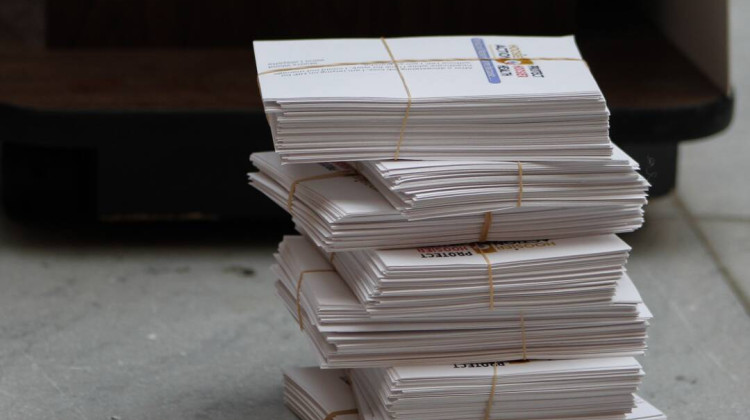Lashkar Gah is the capital of the volatile province that alone grows half of Afghanistan's opium poppy. Cultivation here grew by 34 percent over last year.
On Fridays, hundreds of men gather at the bazaar along the Helmand River, the lifeblood of this arid province. Vendors sell everything from livestock to boxes of artisanal medicine.
There's no sign of poppy here. In fact, the farmers we talk to like 26-year-old Khairullah, who goes by one name, say they are actually too poor to grow it.
"It requires a lot of effort to grow, and you have to wait a long time to harvest," he says.
Khariullah says he barely gets by growing legal crops and he can't afford the extra labor and risk to cultivate poppy. Others here agree, adding that poppy is the main source of insecurity. But, it's not hard to find farmers who do grow it.
We drive across the city and down a quiet residential street of tan brick compounds. We stop and 27-year-old Abdullah hops in the car. It's not safe to visit his village, so he came to the city to meet us.
Abdullah says his family has been farming opium poppies for more than 20 years. He says they can't make a living any other way.
"The major source of income for people in Helmand is opium," he says.
Abdullah says his family grows about 150 pounds and make about $9,000 a year, which is four times what they can make from any other crop.
"We understand that opium is bad," he says. "All drugs are bad. But, it's difficult for us seeing a neighbor with a new car when we are riding bicycles. So, we have to do this to have a better life."
Abdullah admits it's a gamble. One year, he had a crop that was chest-high and ready for harvesting. He went to town one morning, and when he came home, the field had been leveled by the government workers eradicating opium poppies.
Abdullah, who is attending law school and hopes to someday get out of the poppy business, says this year's harvest was excellent.
A United Nations report released Wednesday confirms Abdullah's assessment. The report said opium poppy cultivation hit a record level this year despite the ongoing efforts by Western countries and the Afghan government to reduce production and find alternatives for farmers.
Few Options For Farmers
About six miles outside of Lashkar Gah, past brown fields and mud houses, is the government compound of Nad Ali district.
Fifteen Afghan farmers with creased, leathery faces sit in the meeting hall. Sharifullah, who also gives only one name, says that in addition to corn, cotton, and potatoes, they also grow opium, which the farmers don't hesitate to admit in front of government officials.
"That is because for the rest of our product we have no market," he says. "We can't export [our crops] and get a good price for them. We can't even sustain our families."
Sharifullah says they don't grow opium in the district, but rather on the outskirts in the desert.
"This is a very wide area for the government to eradicate it completely," he says.
Sharifullah says that they all grow small amounts – about 10 to 50 pounds — and small teams of middlemen come to their farms to collect their crops. The Taliban, who make hundreds of millions on the poppy trade, levy taxes on Afghan farmers.
"In the past two years we haven't grown any opium because the government gave us [the alternative of] cotton at a high price," he says.
But, he says the government didn't show up to buy their cotton at the subsidized price, so they have returned to growing opium.
Limited Government Resources
Nad Ali District Governor Mohammed Ibrahim doesn't deny that. He says the government can't provide subsidies to all the small farmers in the district.
Plus, a multi-million dollar program funded by the international community to provide seeds and fertilizer to farmers in Helmand has ended. So, Ibrahim says they now focus on promoting awareness.
"We have been holding campaigns, gathering people into mosques and centers and telling them if they grow poppy, they will lose," he says.
Ibrahim says he's also been focused on getting construction projects in the district to create new jobs.
But, many of the farmers here believe the government isn't really serious about counter-narcotics.
"The farmer's not able to say, 'OK, please help me out here,' because the governance structures continue to be weak," says Ken Yamashita, director for assistance and field operations at the U.S. Embassy in Kabul.
He says there isn't a simple solution to the poppy problem because it's tied to the larger illicit economy in Afghanistan. He and other officials say this is a long-term challenge that requires reforms within a number of government agencies that will easily take 10 to 15 years.
NATO Prepares To Leave
Jean Luc Lemahieu, head of the U.N. Office on Drugs and Crime in Afghanistan, agrees. On a sunny fall morning in Kabul, Lemahieu and a host of Afghan and western officials gather for the ceremonial burning of some 20 tons of drugs and alcohol seized by Afghan law enforcement.
It's events like this that lead Lemahieu to refer to 2013 as the year of the paradox. He says that counter-narcotics institutions are making progress. Still, cultivation has set a new record.
"The prognosis is not very positive," he says. "This illicit economy seems to be established, seems to be taking over in importance from the licit economy."
Lemahieu says that the political uncertainty of the next couple of years with the NATO withdrawal has people hedging their bets and growing more poppy today. And, he says there's another growing problem supporting the poppy trade, domestic demand for opium.
Despite a substantial investment in new clinics and programs, the country only has the capacity to treat 20,000 of its more than a million addicts at a time.
As a result, people like Laila Haidary are taking matters into their own hands. She's opened a clinic and a restaurant, where the employees are recovering addicts.
"My brother was an addict and I was witnessing an addict's life with him living under a bridge full of garbage," she says. "It's difficult for animals to live there."
Her clinic has treated more than a thousand addicts. But, she says treating addicts has come at great cost to her.
"My personal life has been ruined because my husband said that he can't live with a lady that works with addicts and owns a restaurant," she says. "This is the culture of our people."
And, changing culture, whether it's attitudes towards women, or the poppy culture, can take generations.
9(MDEwMDc1MzM3MDEzNDczOTA0MDc1MzViMQ001))
 DONATE
DONATE










 Support WFYI. We can't do it without you.
Support WFYI. We can't do it without you.